US Using Israeli Technology
 The Bush administration has made clear it wants
Israel to stay out of an Iraq war so as not to provoke Arab and
Muslim countries assisting the United States.
The Bush administration has made clear it wants
Israel to stay out of an Iraq war so as not to provoke Arab and
Muslim countries assisting the United States.
But that won't stop Israel's weaponry and arms technology from
being used against Iraqis. After decades of U.S. military aid and
defense cooperation, the U.S. military is permeated by technology
developed in Israel -- from the Army's Hunter drones to the
targeting systems on the U.S. Marines' Harrier jets to the fuel
tanks on its F-15 fighters.
"We'll be shooting down some (French) Mirage 3s, I think, if the
Iraqis ever come up. We may shoot them with an Israeli missile,
from a US warplane," said Joel Johnson, spokesman for the Aerospace
Industries Association, a Washington-based industry lobby.
It would be hard to find a modern military that manages without
technology developed by the Jewish state's feisty industry. Israel
emerged last year as the world's No. 3 arms and military services
exporter -- ahead of even Russia's massive arms industry, according
to Jane's Defense Weekly.
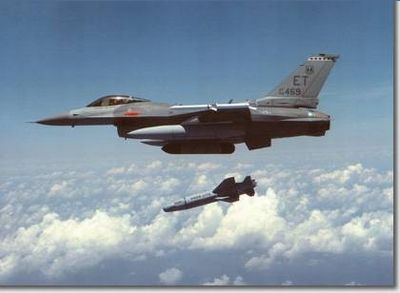
Israel and US: Working Closer Together
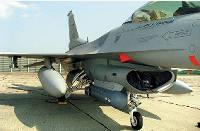 That Israel's weaponry has found a place inside
the mighty U.S. military points to the country's engineering
prowess -- and its status as a favorite ally, said Yiftah Shapir of
the Jaffee Center for Strategic Studies at Tel Aviv University.
That Israel's weaponry has found a place inside
the mighty U.S. military points to the country's engineering
prowess -- and its status as a favorite ally, said Yiftah Shapir of
the Jaffee Center for Strategic Studies at Tel Aviv University.
The U.S.-Israeli friendship "helps to a certain extent, but when
it comes to commercial competition, these sentiments are put
aside," Shapir said. "These are highly advanced and the price is
highly competitive."
Iraqi forces might be on the receiving end of Israeli technology
in several scenarios. A B-52 bomber could fire Popeye
air-to-surface missiles -- dubbed AGM-142 by the U.S. Air Force --
at ground targets. The precision-guided Popeyes were designed by
Rafael, a company partially owned by the government of Israel.
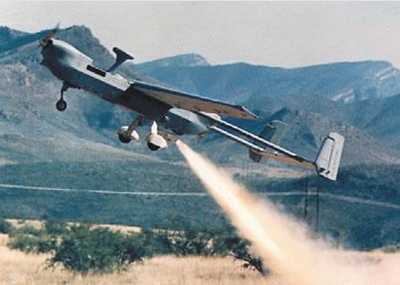
UAV's, Too
Israeli-designed Hunter unmanned aerial vehicles are in the
service of the U.S. Army, and its cousin, the Pioneer, is being
used by the U.S. Marines to scout Iraqi defenses. Both originated
in the design labs of Israel Aircraft Industries, the country's
largest private company.
The Hunter dropped anti-tank munitions in recent U.S. tests, and
could be used alongside the Air Force's armed Predator
missile-firing drone in a ground attack role. Some of the Army's
Bradley fighting vehicles are guided by on-board computers supplied
by a subsidiary of Israel's Elbit Systems, Shapir said. U.S. troops
riding in the Bradleys might also be protected by armor from
Rafael, said Lova Drori, Rafael's director of international
marketing.
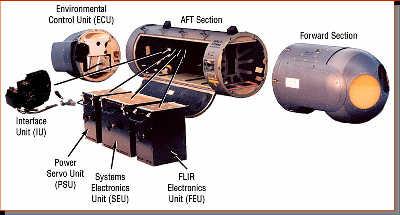
Making Targeting Pods for F-15s and F-16s
Rafael is also the designer of the Litening Targeting Pods used
to fire precision weapons from the Marines' AV-8B Harrier jet, as
well as F-15s and F-16s flown by the Air Force Reserves and Army
National Guard, Drori said.
Israel also makes or designs multiple rocket launchers, mortars,
laser target designators for the Army's Comanche helicopter and
other components, Shapir said. Much of the equipment is
manufactured in the United States by subsidiaries of Israeli
companies, or through joint ventures with U.S. weapons
manufacturers.
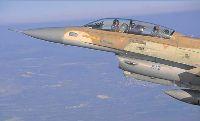 According to Jane's, Israel made more than $3.5
billion in arms sales last year, roughly equal to Russia's massive
arms export industry. Only the United States and Britain sold more,
Jane's reported.
According to Jane's, Israel made more than $3.5
billion in arms sales last year, roughly equal to Russia's massive
arms export industry. Only the United States and Britain sold more,
Jane's reported.
Other sources don't factor in Israel's exports of services --
such as upgrades to tanks and fighter aircraft -- and rank Israel
as a smaller exporter. London's International Institute for
Strategic Studies called Israel the world's No. 5 arms exporter
last year.
Besides the United States, Israel's top customers include
Turkey, India, Brazil, Canada and Germany. China used to be a major
client, but Israel backed off after protests from the United
States, Shapir and others said.
 ANN FAQ: Contributing To Aero-TV
ANN FAQ: Contributing To Aero-TV Aero-News: Quote of the Day (12.10.25)
Aero-News: Quote of the Day (12.10.25) ANN's Daily Aero-Term (12.10.25): North Atlantic High Level Airspace (NAT HLA)
ANN's Daily Aero-Term (12.10.25): North Atlantic High Level Airspace (NAT HLA) Airborne 12.08.25: Samaritans Purse Hijack, FAA Med Relief, China Rocket Fail
Airborne 12.08.25: Samaritans Purse Hijack, FAA Med Relief, China Rocket Fail Airborne-Flight Training 12.04.25: Ldg Fee Danger, Av Mental Health, PC-7 MKX
Airborne-Flight Training 12.04.25: Ldg Fee Danger, Av Mental Health, PC-7 MKX








